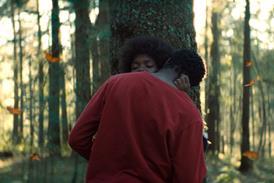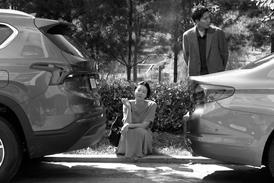Dir/scr: SimoneBitton. France. 2004. 99mins
A poetic reflectionof the Israeli-Palestinian conflict, Simone Bitton's documentary focuses itsattention on the massive wall put up by the Sharon government to separate theJewish community from the Arab and, arguably, defuse the terrorist threat.
Born a Jew into the Arabian culture ofMorocco but brought up in Israel, and living for a while in Paris,Bitton claims the right to represent both sides of the conflict. Her film hasall the well-intentioned, politically correct attitudes of the European leftand deftly avoids the thornier issues which might cloud the perfect argumentsit tries to make.
Visually enticing, often contemplative but decidedlynon-confrontational, Wall is morelike an elegy for a fading dream rather than an accurate rendition of thepresent situation - and as such it is mostly destined to find its way intocultural TV programmes and film events, and less likely to enter into currentaffairs sections. The film screened in Directors' Fortnight at Cannes.
Embracing the position of the opponents of Sharon's Wall - who see it asthe final blow to any chance of peaceful co-existence in the Middle East -Bitton lovingly turns her camera on landscapes which one Palestinian describesas "the Garden of Eden" and sorrowfully documents the systematic destruction ofthis lyrical setting by the forbidding cement structures that are alreadybeginning to take the shape of another Berlin Wall - including the inevitablegraffiti.
She presents both sides' practical and emotional anti-wall arguments andsucceeds in showing how vulnerable even such a solid obstacle is to those whowant or need to cross from one side to another. The only voice of realacceptance for the wall is a high-ranking Israeli official, who concedes it tobe an extremely costly and less than ideal solution. He goes on to clumsilyargue that it is the lesser of all evils.
Staying out of the frame at all times, putting her questions off-screen,as if she is an integral part of the camera, Bitton avoids any pitfalls thatmight sabotage the film's view of these two well-meaning, peace-lovingcommunities, living through a tragedy that is beyond their control.
It is more in resignation than protest that Palestinians describe themiseries resulting from a wall that does not follow a line agreed by bothsides, separates people from their own lands and which prevents bread-winnersfrom reaching their place of work. Most absurd of all is that the workersbuilding the wall are Palestinians themselves, who have no other option if theywant to make a living. There is, however, a soulful testimony of a Kibbutzmember who compares the present state of things with a suicidal love affair.
Consciousthat her trust in human nature is not exactly supported by the daily reportsemerging from this trouble-ridden area, Bitton even suggests that maybe bothsides would need to undergo psychological treatment. Her picturesque film isprobably more idealistic than faithful to the reality of the conflict but,given its extreme complexity, maybe this attitude is needed to counter-balancesome of the over-belligerent statements regularly trumpeted on this issue.
Prodcos: Cine-SudPromotion, Arna Productions
Int'l sales: Wide Management
Prod: ThierryLenouvel
Cine: JacquesBouquin
Ed: CatherinePoitevin-Meyer, Jean-Michel Perez
Music: Gilad Atzmou and the OrientHouse Ensemble, Rabib Ahou Halil



















No comments yet